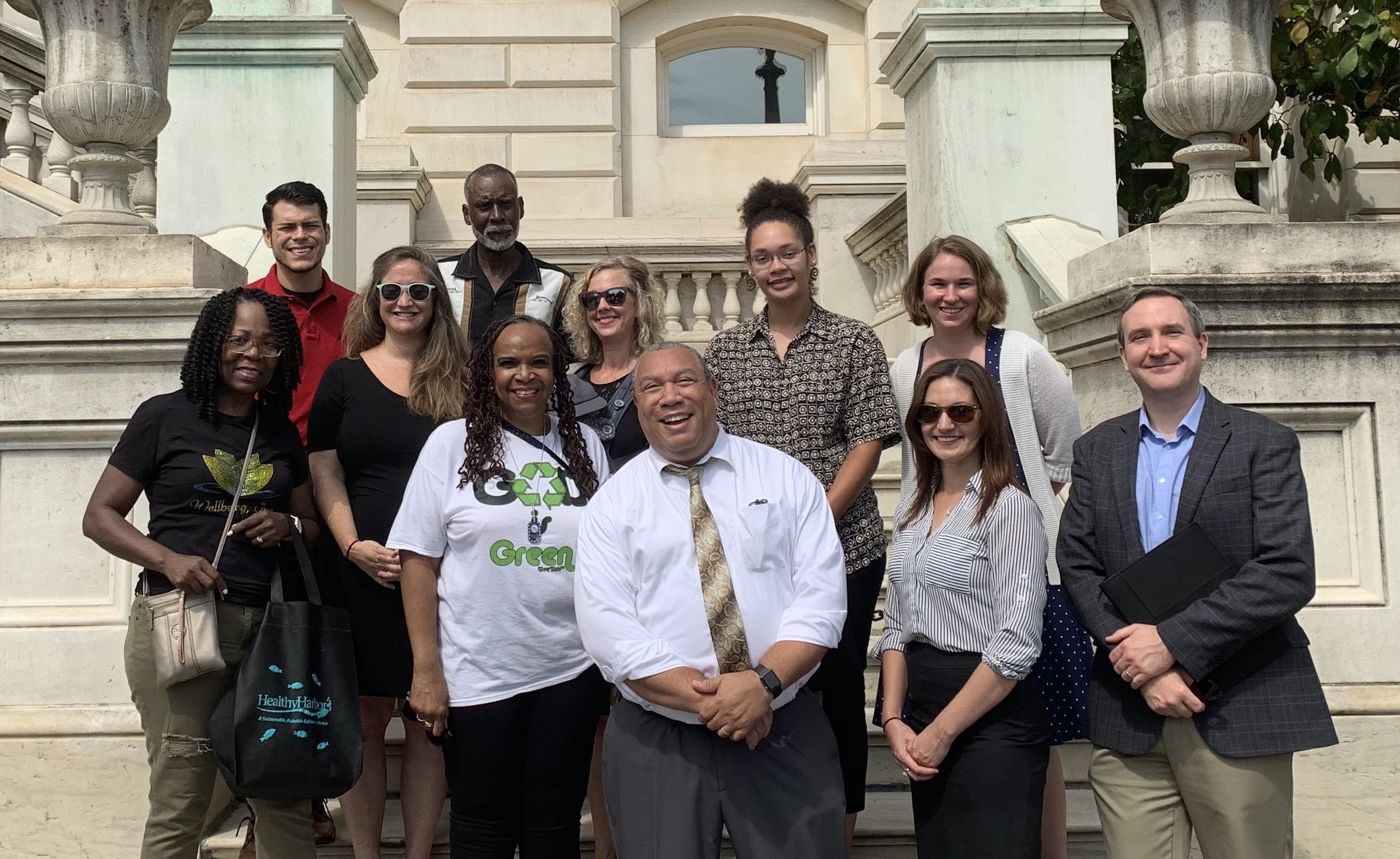
On Tuesday, August 6, the Baltimore City Council's Judiciary Committee held its first public hearing on the Plastic Bag Reduction Bill. This important legislation bans plastic bags in stores in Baltimore, with exceptions for bags used for products like fresh meats, unpackaged fruits, or ice, and locations like farmers' markets and pharmacies. It also puts a 5-cent fee on paper bags - part of which will help the store meet the extra cost of buying and storing paper bags, and part of which can help the city distribute free reusable bags. (Purchases made with SNAP, WIC, and similar programs will be exempt from the fee.) Of course, people bringing their own bags to the store won't have to pay anything - and that's the change we want to see!
At the public hearing, residents, community leaders, and environmentalists from across the city spoke out in favor of the ban.
“We students, are the future, and we don’t want plastic bags to be part of our future.” Janelle (of Poly!) from Bmore Beyond Plastics. Their help was instrumental in drafting this bill. pic.twitter.com/uIPFbN9KeM
— Bill Henry (@BillforBmore) August 6, 2019
“As a minister of our gospel, I understand we must be stewards of the Earth God gave us. I’m here in support of the [Comprehensive Bag Reduction] bill.” - Ms. Cheryl, from Friends of Library Square (among her many responsibilities) pic.twitter.com/ZySu8bsUuO
— Bill Henry (@BillforBmore) August 6, 2019
Even Baltimore's Department of Public Works spoke out in favor of the ban, noting that many residents put their recycling in plastic bags, which can't be recyled in Baltimore City and clog the recycling machines, contaminating whole batches of recycling.
Potential amendments to the legislation were discussed, but not voted on, at this public hearing; the next step will be a Council work session on Wednesday, August 28 at 5PM. That means it's not too late to let the Council know what you think. Read our testimony below for more on the plastic bag ban and potential amendments, and click here to email the Council: it's time to #ReThinkDisposable plastic bags!

19-0401 Comprehensive Bag Reduction
Judiciary Committee
August 6, 2019
Position: Favorable
Dear Chairman Costello and Members of the Committee,
Clean Water Action is a grassroots advocacy organization focused on issues that impact water quality in Baltimore, Maryland, and nationally. Our Maryland office has been based in Baltimore City since 1980.
Plastic bags are a persistent source of litter in our streams and waterways, a nuisance for storm drains and a nightmare at recycling facilities. They are lightweight and durable, enabling them to easily float away and remain in our environment for years.
Every year, Americans throw away more than 100 billion plastic bags. While recycling is technically feasible and collection is often found at grocery stores, recycling rates average around 7 percent. In Baltimore City, plastic bags are not accepted at the curb. Well meaning residents often place them in curbside recycling, where they tangle and foul up recycling equipment and can contaminate batches of plastic.
When thrown away, plastic bags do not rot if sent to a landfill. If they are sent to an incinerator, like the one in South Baltimore, they melt and create dioxins, a group of highly toxic chemicals that contribute to the risk of diabetes, cardiovascular disease, impaired immune response, cancer, and a host of other health impacts. Recycling and education are not feasible solutions - proper recycling is difficult and when thrown away they sit forever or burn and pollute the air.
This is why we support this legislation to move off Baltimore off plastic bags. By charging a small fee on paper bags, which are more expensive but can be recycled, composted, or decompose in a landfill, and returning some of that fee to business owners this bill does not place an undue burden on businesses in the area.
Clean Water Action encourages the Committee to retain the provision exempting purchases made with SNAP, WIC, and similar programs from the fee. While assessing this fee is important for fairly reimbursing retail establishment for the extra cost of paper bags and encouraging people to bring reusable bags, assessing this fee on households already the most in need of financial assistance would not be equitable.
While this legislation cannot specify how city funds raised by the fee on paper bags be used, we believe that this extra revenue should be devoted towards providing free, durable, reusable bags to Baltimore City residents. Moving toward a zero waste future where we rethink disposable products overall - whether paper or plastic bags - is the direction we need to go to combat climate change and protect local air and water pollution.
Finally, this bill should not be narrowed to only apply to grocery and food establishments. The impact of plastic bags have on the environment does not change depending on where or how the bag was used. All plastic bags have negative impacts, including: pollution impacts of extracting the oil to create them, the batches of recycling they contaminate, clogging storm drains, and generally contributing to litter.
Thank you for your attention to this issue. Bag bans are a common sense approach to dealing with these non-degradable products that are thrown away regularly, amassing in landfills, storm drains, and our waterways.
Sincerely,
Emily Ranson
Maryland Program Coordinator
Clean Water Action


